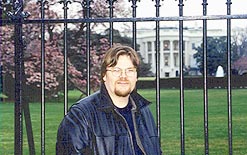
"All that is old and already formed can continue to live only if it allows within itself the conditions of a new beginning."
Schiavo Case: Slapping
Down Morality's 'Heroes'Posted 10:29 p.m., April 10, 2005
|
After Schiavo, Republicans looked diminished in their claim to speak for the nation's moral values. President Bush, who rushed theatrically back from Texas to sign a law passed specifically for Schiavo, looked more like president of the cultural Right than of the country. Riding to the rescue of a damsel in distress, Bush and congressional Republicans were greeted not with a kiss on the cheek but with a sock in the jaw.
-- Jonathan Rauch,
The National Journal,
April 9, 2005A fellow in my church had been a stand-up comic and local late-night television show host--a fellow with a gift for brilliant, off-kilter banter. But he had in his latest years grown badly affected by a terrible degenerative disease. It was so bad, and I met him so late into his illness, that when he tried to speak to me, struggle as I might, I couldn't understand. I could only nod pleasantly, with an embarrassed look flashing in my eyes conveying the same kind of incomprehension a tourist in an unfamiliar land might experience confronted with a strange language.
It was tremendously tragic. But the man knew he was dying, and refused to compound the tragedy. He wanted nothing to do with artificial means of preserving his life. As he told his wife, a vegetable can be green and leafy and pungently aromatic. But it cannot be "alive."
Perhaps you'd argue that Terri Schiavo was no vegetable. She could move at least in a limited way, she could breathe on her own. Videos appeared to show her smiling--though even the most generous would have to concede it was the same kind of smile radiated by the smallest of infants, the kind of smile that one can never be sure is a smile--but that parents always insist really is.
Now we wait for the results of the woman's autopsy to tell us the definitive state of her brain injury--but of course, the doctors involved in this exercise will be labeled merchants in the culture of death if they do not declare her gray matter to have been functioning at the level of a physics professor's.
My suspicion is that she was in the same shape as the wounded airman in John Irving's novel "The World According to Garp"--a person able to respond at the most primitive levels to the most basic stimuli, but someone with no real mind, no real life. Maybe that is what constitutes, as some contended, a state of "minimal consciousness" as opposed to a vegetative state. I'm no doctor, I don't know. Even the cleansed phrase "minimal consciousness" itself sounds to these ears like some sort of state of living death.
All I can say for certain about her state is that Terri Schiavo was living a kind of life that I would never want for myself.
So let's put it out there. Should I be rendered incapable of thought by disease or injury, should I become so incapacitated that I am left with the personality and brain capacity of an infant, I want to die. Unhook the IVs, yank the tubes and pull the plugs. Let me die. Just do it.
Big Brother is Helping You
On that remarkable night when Congress intervened in the Schiavo case, I tuned in CSPAN to catch the House floor debate. What I saw was unforgettable.
I think that night might mark the moment that Congressional Republicans finally chased away the centrists whose provisional support they managed to attract in the past two elections, the mid-term of '02 and last year's presidential race. As I watched CSPAN that night, the Senate had already passed legislation that would allow a federal court to intervene in the case, and the House was debating the same measure. The president, it was announced, had theatrically jetted back from his ranch in Crawford, Texas to sign it into law when it inevitably passed.
It was sad, and not a little alarming to watch the spectacle, as one after another, Republicans tripped over themselves to justify their desire to overturn centuries of precedent that life/death decisions are the purview of husbands and wives in order to pressure the courts to make this one case--this lone family's struggle--the exception. It would be an exception, they fantasized, that would set no precedent for future such actions.
Hard to imagine why they thought that. There are 30,000 other Terri Schiavos--Americans, here and now, living in persistent, vegetative states. The Schiavo case certainly establishes a precedent, and one that Congress likely will live to regret.
Even harder to figure out is why these folks plunged into this without expecting the fallout from the center, and the parts of the political right as well as the left, that certainly more than a few suspected was coming. This time, just as so many of the Democrats I know said they would, the Republicans plainly overreached.
"Republicans failed to keep Schiavo alive, and they also took a beating from public opinion. 'Every national media poll... has found a majority of Americans agreeing with the court rulings that prevented reinserting the [feeding] tube that was removed on March 18,' reported the Gallup Organization on March 29, two days before Schiavo's death. As William Schneider noted in this magazine last week, an 'overwhelming' 82 percent of the public told a CBS News poll that Congress and the president should not be involved in the case. Majorities -- not just of liberals and Democrats, but also of conservatives, Republicans, churchgoers, and white evangelical Christians -- agreed that federal politicians should butt out.
-- Jonathan Rauch,
The National Journal,
April 9, 2005
Here is just a quick sample of the "butting in" that Congress, on the House side, engaged in that night, courtesy of CSPAN and the digital pause button on my cable box:
Out of Florida, there is no justice. Justice requires only that judges exercise prudence. Where is the legal analysis that weighs the issue of Terri not being allowed a CAT scan and further medical diagnostic evaluation? Where is the balance of the scales of justice that weighs Terri's family's parental rights against the rights of her estranged husband?
-- Rep. Rick Renzi, R-Ariz.
...
"With his fiancé and two children by his fiancé, it would be very inconvenient if she recovered."
-- Rep. Mark Souder, R-Ind.
...
"To second-guess the Florida legislature, Florida courts and Terri's choice is just plain wrong. We should not be engaged in second guessing many neurologists and onsite healthcare professionals who have seen the patient, performed tests and attested to the courts that Terri is not going to recover."
-- Rep. Ginny Brown-Waite, R-Fla.
...
"Terri Schaivo's husband is her guardian and is duty bound in my mind to make decisions that are in Terri's best interest. Even the most casual observer would realize he is conflicted. He lives with another woman, he has fathered two children with this other woman. This is a conflict of interest between what is his personal best interest and … those of Terri.
-- Rep. Michael Conaway, R-Texas.
...
"For the life of me, I can't understand why we're here. We were all snapped out of our houses of worship to run over to Washington to violate the triumvirate of the judicial, the legislative and the administrative, but I guess the leadership understands what it is and they're calling it a wedge between Democrats and Republicans. I'm calling it what is right and what is wrong. We have no business being here."
-- Rep. Julia Carson, D-Ind.
...
"I say again, the legal and political issues may be complicated, but the moral ones are not."
-- Rep. Tom DeLay, R-Texas
Stealing a Death?
There was a New York Times column not long ago, written by I no longer remember who, that discussed this issue first hand. The woman writer had to make a difficult decision about her father, whose brain had been ravaged to infantilism by Alzheimer's.
There comes a time, the writer said, when a decision has to be made as to whether a life is being protected, or if a death is being stolen.
For all the words of big shot national politicians that I've quoted above, it is the words of a Minnesota legislator that seem to hit closest to the real issue at hand. Minnesota state Sen. Sheila Kiscaden told me recently that the Schiavo case, for her money, points to a spiritual deficiency that we are suffering as a culture. Put simply, we are not OK with the hard reality that we will die.
As the senator puts it, we now live in an age where our ability to extend life through artificial and technological means far outstrips our ability to make "the tragic choices" about who should live and who should die, and under what circumstances. The Schiavo case, perhaps more than anything, illuminates the struggle that is to come as our affluent, aging society begins to confront very similar life and death medical issues on potentially a massive scale.
"We view [dying] as giving up instead of letting go," the senator told me. "We have to recognize that life is finite."
-- Kevin Featherly


